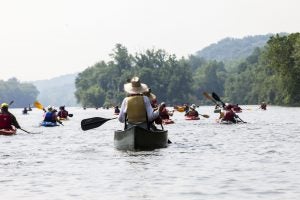Readers share their ideas on waterfront revitalization

Rowers shrouded in fog move along the Schuylkill River in Philadelphia. (AP Photo/Matt Rourke)
We asked you what your cities should do with their waterfronts. Here’s a look at some of the responses.
Last week, we asked you what your cities should do with their waterfronts.
Here’s a look at some of the responses from Facebook.
[View the story “What should your city do with its waterfront?” on Storify]
We also got a few emails, including one from John Hogan, board member at Philadelphia City Rowing, a nonprofit group that teaches high school students how to row. (He’s also president of The Mariner Insurance Group, which, full disclosure, provides insurance coverage for boats, marinas, and yacht clubs.)
Hogan said Philadelphia needs a community boathouse on the Schuylkill River. He says that although the city has many boathouses with rowing clubs, they’re all private. He wants to see a public facility where people can learn to row and paddle. Hogan cited examples in other cities, like Boston’s Community Rowing, and Pittsburgh’s Three Rivers Rowing Association.
Philadelphians have long viewed rowing as inaccessible and elitist, wrote Philadelphia City Rowing Executive Director Terry Dougherty in a statement. Youth rowing is dominated by private schools, giving other students little chance to learn the sport, she wrote. Adults also have limited options, as most boat clubs are prohibitively expensive, with membership dues close to $1,000 a year.
Dougherty said a public boathouse would “create significant opportunities for recreation, education, social inclusion and economic vitality.” Ideally, the boathouse would have public restrooms, river access, dock space, classrooms and meeting spaces, locker rooms with showers, an observation deck and a picnic area.
Pennsylvania isn’t the only state that needs to revitalize its waterfronts, said New Jersey resident Peter Wagner. In an email, he wrote that “in order for Trenton to take full advantage of its Delaware River waterfront,” Route 29 needs to be re-routed. The highway “essentially separates downtown Trenton from the river,” Wagner wrote. In that sense, Trenton sounds like so many cities in Pennsylvania, where highways were built along rivers and now are more or less a barrier to river access.
Wagner would also like Trenton to add a bike trail, music pavilion and picnic areas to its waterfront, features he says could complement residential and commercial development.
Do you have any other ideas for your city’s waterfront? If so, tell us on Twitter @pacrossroads, on Facebook at Keystone Crossroads, or via email at msegarra@whyy.org.
WHYY is your source for fact-based, in-depth journalism and information. As a nonprofit organization, we rely on financial support from readers like you. Please give today.



